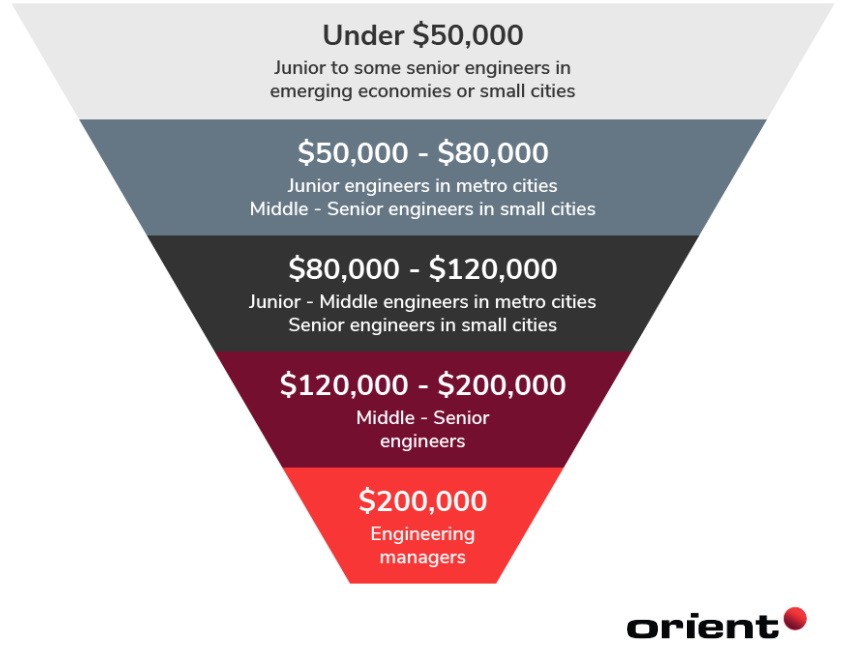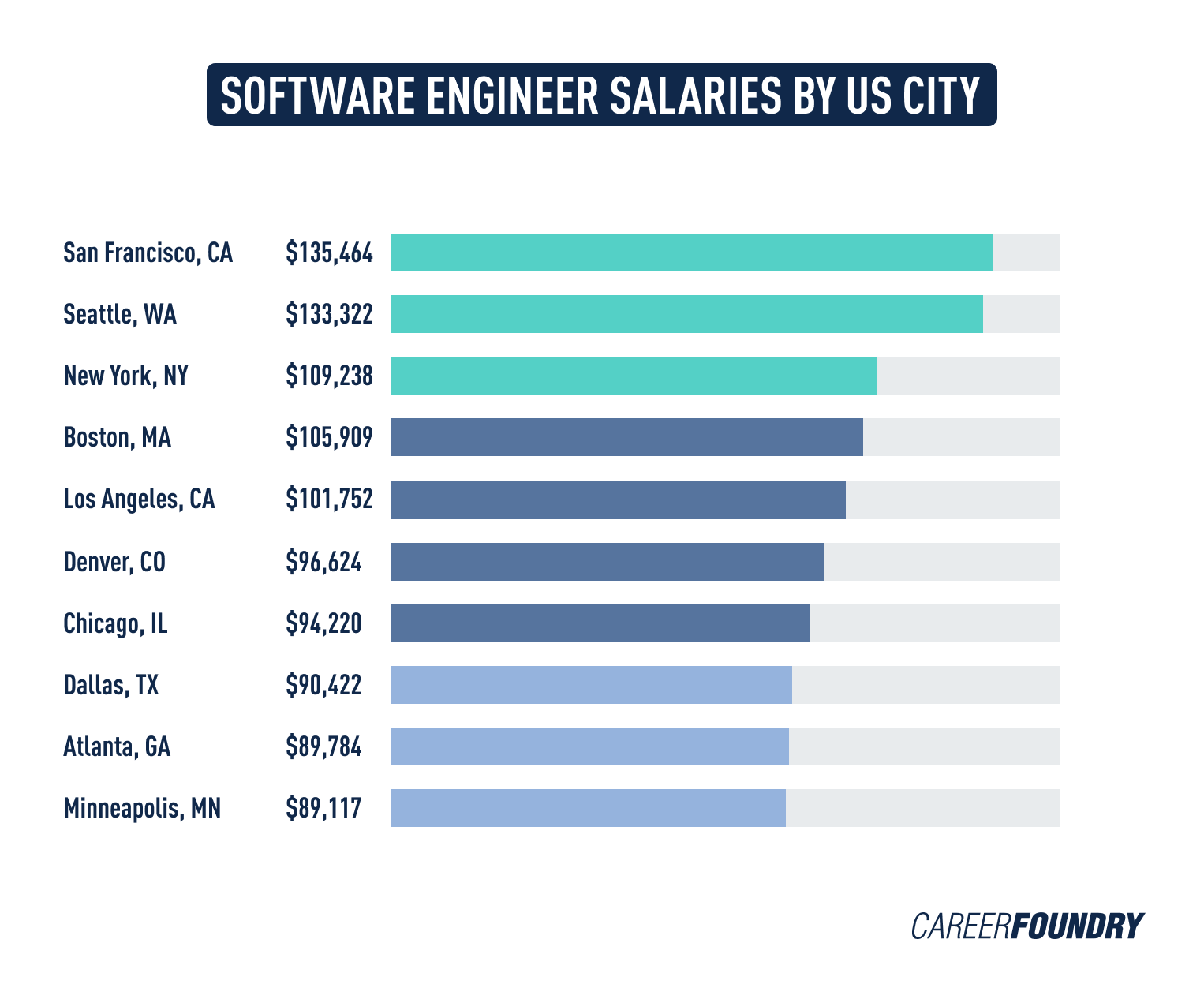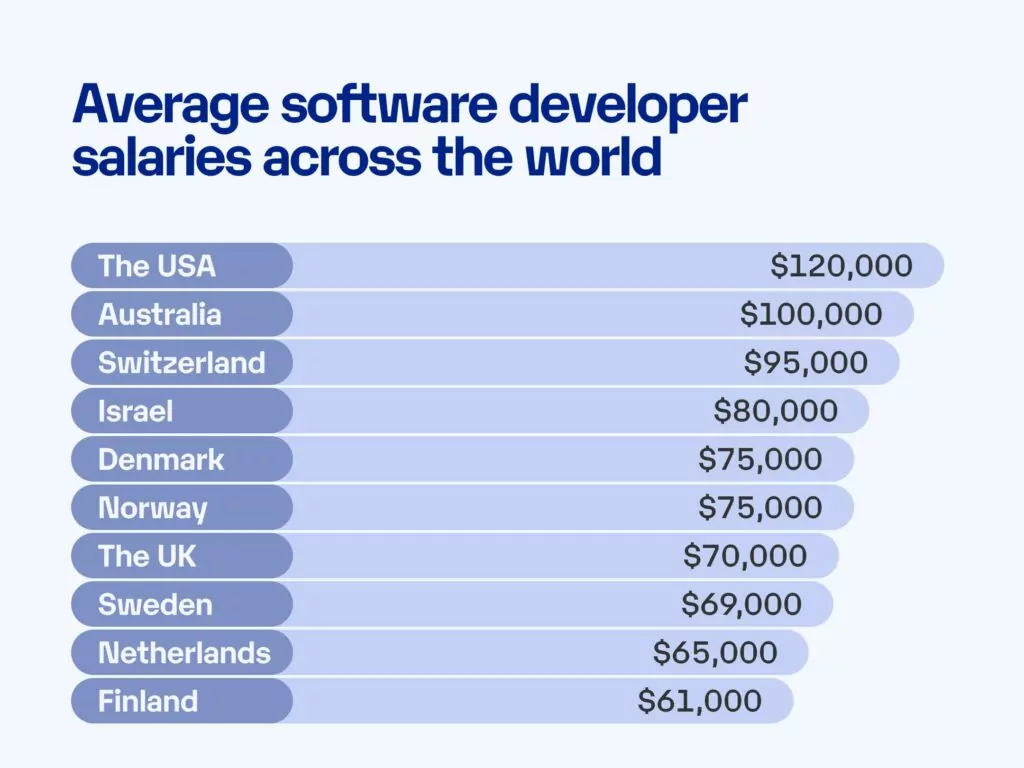Software engineering salaries vary widely based on experience, location, and industry. Entry-level positions can start around $70,000 annually.
Software engineering is a highly sought-after profession. It offers competitive salaries and numerous career opportunities. Companies value skilled software engineers for their ability to develop, maintain, and improve software systems. The demand for software engineers has surged, driven by the increasing reliance on technology across all sectors.
This profession requires strong technical skills, problem-solving abilities, and continuous learning to keep up with evolving technologies. Software engineers often enjoy additional perks such as flexible work hours, remote work options, and professional development opportunities. Whether in startups or large corporations, software engineering remains a lucrative and dynamic career choice.
Introduction To Software Engineering Salaries
Understanding software engineering salaries is crucial for anyone in the tech industry. Knowing how much you can earn helps in career planning. It also aids in negotiation during job offers.
Importance Of Salary Insights
Knowing salary ranges is vital for many reasons. It helps set realistic expectations. It also allows for better financial planning.
Employers use salary data to attract top talent. They need to offer competitive wages to stay ahead.
For job seekers, this information is equally important. It helps in making informed career choices.
Factors Affecting Salaries
Several factors influence software engineering salaries. These include:
- Location: Salaries vary by city and country.
- Experience: More experience often means higher pay.
- Education: Advanced degrees can lead to better salaries.
- Industry: Different sectors pay differently.
- Skills: Specialized skills can command higher wages.
| Factor | Impact on Salary |
|---|---|
| Location | High |
| Experience | Very High |
| Education | Moderate |
| Industry | High |
| Skills | Very High |
Understanding these factors helps in navigating your career path. It also assists in salary negotiations.

Credit: www.orientsoftware.com
Average Salary By Experience Level
The salary of a software engineer varies by experience level. Entry-level positions, mid-level engineers, and senior engineers all earn different amounts. Let’s explore the average salary by experience level.
Entry-level Positions
Entry-level software engineers often start with a competitive salary. They typically have less than two years of experience. On average, they earn between $60,000 and $80,000 per year. This range can vary based on location and company size.
| Experience | Average Salary |
|---|---|
| 0-2 years | $60,000 – $80,000 |
Mid-level Engineers
Mid-level engineers have between 2 to 5 years of experience. They often handle more complex tasks and projects. Their average salary ranges from $80,000 to $120,000 per year. This is due to their higher skill level and responsibilities.
| Experience | Average Salary |
|---|---|
| 2-5 years | $80,000 – $120,000 |
Senior Engineers
Senior engineers have over 5 years of experience. They lead teams and make important decisions. Their average salary is between $120,000 and $160,000 per year. This reflects their expertise and leadership skills.
| Experience | Average Salary |
|---|---|
| 5+ years | $120,000 – $160,000 |
Salary By Geographic Location
The salary of a software engineer varies widely by geographic location. Factors like cost of living, demand, and economic conditions play a role. Let’s break it down by regions.
United States
In the United States, software engineers earn high salaries. The average salary is about $110,000 per year. In tech hubs like San Francisco and New York, salaries can be even higher.
- San Francisco: $140,000
- New York: $130,000
- Seattle: $120,000
Smaller cities and rural areas tend to offer lower salaries. However, the cost of living is also lower in these places.
Europe
In Europe, salaries vary widely between countries. Western Europe generally offers higher pay than Eastern Europe.
| Country | Average Salary |
|---|---|
| Germany | $75,000 |
| United Kingdom | $70,000 |
| France | $65,000 |
| Poland | $40,000 |
| Romania | $35,000 |
Western Europe offers better salaries but higher living costs. Eastern Europe has lower salaries but the cost of living is also lower.
Asia
Asia has a wide range of salaries for software engineers. Some countries have booming tech industries.
- Singapore: $60,000
- Japan: $55,000
- India: $20,000
- China: $30,000
Countries like Singapore and Japan offer competitive salaries. In contrast, salaries in India and China are lower but growing.
Industry-specific Salaries
Software engineering salaries differ across industries. Certain sectors pay more based on their unique demands. Below, we explore salaries in different industries.
Tech Companies
Tech companies typically offer the highest salaries. This is due to the high demand for skilled engineers. Here is an overview:
| Company | Average Salary |
|---|---|
| $150,000 | |
| Amazon | $145,000 |
| $155,000 |
Financial Sector
The financial sector also offers competitive salaries. The complexity of financial systems requires advanced skills. Below are some figures:
- Goldman Sachs: $140,000
- JPMorgan Chase: $135,000
- Citibank: $130,000
Healthcare Industry
In the healthcare industry, software engineers develop critical systems. This sector also pays well due to the importance of the work. Here are some examples:
- UnitedHealth Group: $125,000
- Anthem: $120,000
- CVS Health: $115,000
Educational Background And Salary
Understanding the relationship between educational background and salary in software engineering can help aspiring engineers make informed decisions. Different educational paths can lead to varied salary outcomes. Let’s explore how the level of degree and the type of education impact salaries in this field.
Impact Of Degree Level
The level of degree you hold can significantly impact your salary. A higher degree often correlates with higher pay.
| Degree Level | Average Salary |
|---|---|
| Bachelor’s Degree | $85,000 |
| Master’s Degree | $100,000 |
| PhD | $120,000 |
As shown, a PhD can lead to significantly higher earnings. Many companies value advanced expertise and are willing to pay more for it.
Bootcamps Vs. Traditional Education
Bootcamps and traditional education both provide routes to a career in software engineering. Each has its advantages and impacts on salary.
Bootcamps are intensive, short-term programs. They focus on practical skills and real-world applications. Graduates often find jobs quickly.
Traditional education, like a university degree, provides a comprehensive understanding. It often includes theoretical knowledge and a broader skill set.
- Bootcamp Graduates: Average starting salary around $70,000.
- University Graduates: Average starting salary around $85,000.
Both paths can lead to successful careers. Choose based on your learning style, financial situation, and career goals.
Influence Of Certifications
Certifications can significantly impact a software engineer’s salary. They validate skills and knowledge in specific areas. Employers often value certified professionals more. Certified engineers usually earn higher salaries compared to their non-certified peers. Let’s explore this in detail.
Popular Certifications
Several certifications stand out in the software engineering field. Here are some of the most popular ones:
- Certified Software Development Professional (CSDP): Offered by IEEE, this certification is highly respected.
- Microsoft Certified: Azure Solutions Architect Expert: This is essential for cloud computing experts.
- Certified ScrumMaster (CSM): This certification is crucial for agile project managers.
- Oracle Certified Professional, Java SE Programmer: Vital for Java developers.
- Google Certified Professional Cloud Architect: Important for those working with Google Cloud.
Certification Vs. Experience
Both certification and experience play vital roles in determining salary. Let’s compare them.
| Aspect | Certification | Experience |
|---|---|---|
| Validation | Industry-recognized proof of skills | Practical, hands-on expertise |
| Learning | Structured learning paths | Learning by doing |
| Networking | Access to professional communities | Connections through work experience |
| Salary Impact | Often leads to immediate salary boost | Gradual salary increase over time |
Both certification and experience are valuable. Combining them can lead to the highest salary potential. Young professionals can benefit greatly from certification. Experienced engineers can use certification to validate their skills.
Freelance Vs. Full-time Salaries
Software engineering is a lucrative career path. Both freelancing and full-time positions offer different salary structures. Deciding between freelancing and full-time work depends on various factors.
Pros And Cons Of Freelancing
Freelancing provides flexibility and independence. Freelancers can choose projects and set their own schedules. This type of work suits those who prefer a varied workload.
- Pros
- Flexible working hours
- Choice of projects
- Potential for higher earnings
- Cons
- Inconsistent income
- No employer benefits
- Requires self-discipline
Income Potential For Freelancers
Freelancers often have the potential to earn more. They can charge hourly or per project rates. Here’s a comparison table showing potential earnings:
| Experience Level | Hourly Rate | Annual Earnings (Estimated) |
|---|---|---|
| Junior Developer | $25 – $50 | $50,000 – $100,000 |
| Mid-Level Developer | $50 – $100 | $100,000 – $200,000 |
| Senior Developer | $100 – $200 | $200,000 – $400,000 |
Freelancers can also take on multiple projects. This increases their income potential. They need to manage their time efficiently. Freelancers must also handle their own taxes and insurance.

Credit: careerfoundry.com
Negotiating A Higher Salary
Negotiating a higher salary can be nerve-wracking. It’s crucial for software engineers to know their worth. Understanding effective negotiation strategies can make a significant difference. Let’s delve into some tactics to boost your salary offer.
Effective Negotiation Strategies
Preparation is key. Start by researching the average salary for your role. Websites like Glassdoor and Payscale can help. Knowing the industry standard gives you a strong foundation.
Build a list of your accomplishments. Highlight projects you’ve completed successfully. This shows your value to potential employers. Use specific metrics to back up your claims.
Practice your pitch. Role-play with a friend or mentor. Confidence comes from preparation. It helps you stay calm during the negotiation.
- Research industry salary standards
- Document your achievements
- Practice your negotiation pitch
Leveraging Job Offers
Having multiple job offers can be a powerful tool. It gives you leverage in negotiations. If you have another offer, mention it. This shows employers that you’re in demand.
Be honest about your offers. Don’t fabricate offers to boost your salary. Integrity is crucial in professional settings.
| Offer Details | How to Leverage |
|---|---|
| Higher Salary | Highlight the higher offer |
| Better Benefits | Emphasize the better benefits |
| Flexible Work Hours | Point out the flexible hours |
Use your offers to negotiate for more than just salary. Consider benefits like remote work options or additional vacation days. These can be just as valuable as a higher salary.
Future Trends In Software Engineering Salaries
The world of software engineering is ever-evolving. This change impacts salaries in the field. Understanding future trends can help software engineers plan their careers. Here are some key trends to watch.
Impact Of Ai And Automation
Artificial Intelligence (AI) and automation are changing the software industry. These technologies increase efficiency and reduce manual tasks.
AI-powered tools can write code, test software, and debug issues. This can lead to higher productivity and demand for AI skills.
Software engineers with AI and automation skills will be in high demand. Their salaries are expected to rise as these technologies become more widespread.
Projected Salary Growth
The demand for software engineers is growing rapidly. This growth is expected to continue in the coming years.
The table below shows the projected salary growth for software engineers:
| Year | Average Salary |
|---|---|
| 2023 | $105,000 |
| 2024 | $110,000 |
| 2025 | $115,000 |
| 2026 | $120,000 |
As the table shows, salaries are expected to increase steadily. This growth reflects the increasing importance of software in various industries.
Key factors driving salary growth include:
- Technological advancements
- Increased demand for software solutions
- Shortage of skilled engineers
By staying updated on these trends, software engineers can maximize their earning potential.

Credit: www.trustshoring.com
Frequently Asked Questions
What Is The Average Salary For Software Engineers?
The average salary for software engineers varies by location and experience. In the US, it ranges from $70,000 to $120,000 annually.
How Does Experience Affect Software Engineering Salaries?
Experience significantly impacts salaries. Junior engineers earn less, while senior engineers and tech leads can earn over $150,000 annually.
Which Cities Offer The Highest Software Engineering Salaries?
Cities like San Francisco, New York, and Seattle offer the highest salaries, often exceeding $120,000 per year.
Do Software Engineers Receive Bonuses?
Yes, many software engineers receive annual bonuses. These can range from 5% to 20% of their base salary.
Conclusion
Exploring software engineering salaries reveals strong earning potential and career growth. Competitive pay attracts talent worldwide. Staying updated with industry trends ensures better opportunities. Pursue continuous learning to enhance skills and marketability. The field remains promising for both current and aspiring professionals.

